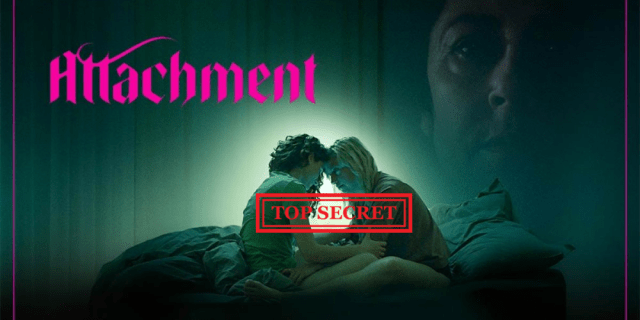Shudder Secrets: Attachment Explained

If you’re looking for something spooky to watch this Valentine’s Day, let me suggest Attachment, a queer love story with hair-raising supernatural elements. Writer/director Gabriel Bier Gislason’s debut feature is a sharp story with a creeping sense of dread rooted in Jewish mythology. A trio of strong female performances elevates this film beyond the usual horror tropes.
Not only does the film base some of its scares on the Jewish religion, but it also addresses themes of loneliness and mental illness. The plot centers around a young scholar caught between her mother and her female lover. Fair warning: some light spoilers are included below for this Shudder exclusive.
Attachment’s Subversion of Rom-Coms
Attachment initially plays out like a familiar rom-com. Has-been actress Maja (Josephine Park) literally bumps into young scholar Leah (Ellie Kendrick) at a library. At first, the brightly-lit set design feels like a Hallmark movie, especially considering that Maja is dressed as an elf, a character she played on TV before her career dried up. They spend a passionate night together as sparks fly.
However, during their first night together, Leah has a seizure and breaks her leg, forcing her to return home to the Hasidic area of Stamford Hill, London with Maja following. The setting is a sharp contrast to the cheery, rom-com opening in the library followed by Maja’s relaxed Scandinavian apartment. Leah lives in London with her mom Chana (Sofie Gråbøl). They reside on separate floors in the darkened, wood-paneled home.
The shift in setting sets up the rest of the film as a unique supernatural thriller steeped in Jewish mythology. The creaky-floored, shadowy setting is used to the utmost effect. Chana’s superstition and faith run strong. There’s salt around every corner and bowls scattered about to ward off demons. This shift in setting and tone subverts the rom-com opening in a clever fashion. This certainly isn’t the Hallmark film the opening 10 minutes tease.
Attachment’s Exploration of Jewish Mythology
Namely, through Leah’s uncle, Lev (David Dencik), the film namedrops various elements of Jewish mythology. Lev runs a Jewish mysticism shop of sorts and frequently educates Maja, who is non-Jewish. There’s mention of the golem, a monster made out of clay and magically brought to life by a rabbi in Prague to protect the city’s Jewish population. There’s also an important nod to the dybbuk, an evil entity that possesses the body of the living. The only way to exorcise it is by finding out who they are and what they want.
As the film progresses, Leah continually exhibits stranger and stranger symptoms, until it appears she’s fully possessed by a dybbuk. There are some parallels here between Attachment and the 1920 play “The Dybbuk” by S. Ansky. In short, the play is about a young woman, Leah, possessed by a dybbuk on her wedding day. The spirit that possesses Leah belongs to Channon, a young scholar who loved her and died once learning she was betrothed to another. The parallels between the two Leah characters are obvious, and Chana could be a stand-in for Channon. Their names are similar, and Chana tries to shove Maja out of the picture, exhibiting jealousy far more than once. She takes the overprotective mother trope to the extreme.
Attachment, Mental Illness, and Mothering
What also works so well about the film is the way it handles mental illness and mothering. Chana can certainly be viewed as a villain. She frequently challenges Maja for her daughter’s love and at one point, puts peanuts in her dinner, knowing she’s allergic to them. Gråbøl’s performance draws both fear and sympathy from the viewer. Chana is not a black-and-white character. We get her backstory in drips and drabs, namely through Leah.
Early in the film, Leah explains to Maja that Chana wasn’t born into a strictly religious family. However, when she met Leah’s dad, she moved for him but never fit in. “It’s not that kind of community that you can join,” Leah says. She adds that her dad insisted on staying in the Hasidic London neighborhood, trying to make it work, before eventually bailing on the family. Leah notes, “I think he kind of broke something in her…even after he left us..she still tries to fit in.”
Frequently, there’s the sense Chana wanted more out of life. At one point, she says that she can make a bowl of chicken soup for Maja because she has nothing else to do with her life. When Maja cracks a bowl meant to protect against evil, Chana tells her it’s a copy that she made. It’s replaceable, like her, she says. While Chana certainly enacts unjust levels of cruelty against Maja, she has a tragic backstory. Her life simply never turned out the way she wanted it to. Sounds similar to another favorite from last year. She moved for a man who ditched her, and Leah is all she has left, hence her overprotective nature and obsession with her daughter. However, without spoiling the potent and powerful ending, Chana’s character is certainly redeemed.
Overall, Attachment is quite an impressive debut by Bier Gisalson. It features compelling female performances, rich Jewish mythology, and an unnerving setting steeped in superstition. This is a well-crafted, frightful queer love story. It arrives on Shudder on Feb. 9. Keep updated on the streaming service’s newest content by following my Shudder Secrets column.
Brian Fanelli is a poet and educator who also enjoys writing about the horror genre. His work has been published in The LA Times, World Literature Today, Schuylkill Valley Journal, Horror Homeroom, and elsewhere. On weekends, he enjoys going to the local drive-in theater with his wife or curling up on the couch, and binge-watching movies with their cat, Giselle.
